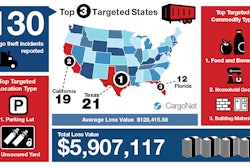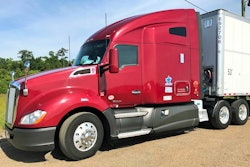Those decisions are likely already arrived at — if you’ve done what Overdrive Extra contributor Gary Buchs advised around Memorial Day last year. That is, you’ve marked out this week on the calendar (along with the weeks of Memorial and Labor Days, among some others) as a reliable business four-day week, when government offices as well as many other facilities around the nation will be (mostly though not totally reliably, I should say) closed an extra day in observance of the July 4 holiday, which falls on a weekend (Saturday). For most businesses shutting down an extra day in observance, when the Fourth falls on a Saturday, it’s Friday that usually gets the kibosh.
We told owner-operator Chuck Kumalaa‘s story last year — his decision to spend the long Memorial Day weekend out “chasing the dollar,” as he put it, on a multidrop run from Texas to Missouri that offered no opportunity to get back in to his home in Marion, Ohio, if he took it. It would occupy him through the weekend entirely, with an extra day or two’s time on the load, given it couldn’t deliver until Tuesday, after the holiday. He took advantage of that extra day down, you may recall, to “get some new steer tires put on the truck,” he said, something he’d been waiting for the opportunity to get done. He added:
 Owner-op Chuck Kumalaa
Owner-op Chuck Kumalaa“I’ll probably do a good bit of cleaning things you put off here and there. Maybe find a theater somewhere close and see a movie” — stay away from casinos along the Texas-to-Missouri route, nonetheless.

“Sometimes you have to bite the bullet when you’re looking at your bottom line,” he adds of his decision to stay out. “This load was profitable enough” to justify the decision.
He found a way to make good use of the time, ultimately, without unnecessary spending. If you’re faced with the same decision right about now, weigh the cost of time versus the profit in the load — and take into consideration how you’ll spend that extra time between origin and destination, such as it may be, to see whether it’s worth the opportunity cost you’ll spend not hauling if that’s the situation. Use your hourly cost estimate, often computed by independents and larger carriers in determining fair detention rates, if you want to get dollars-and-cents specific about calculating the decision.
If you’ve already made that choice to stay out, given Thursday this week is the new Friday and thus today might well be this week’s Wednesday, the old spot-market “3 o’clock hustle” could be your friend this afternoon, or really any afternoon this week, as desk-bound brokers get nervous about covering loads in particular markets — use your load board’s metrics to determine if demand is favoring you where you’re searching, and proceed accordingly.
And you know what they say about Fridays (Thursday in this case) in any time when it comes to those nervous brokers, much less the day before a holiday weekend. Find a long three-day run to get full utilization of the truck Friday-Sunday to deliver on Monday and you’ve found that old golden goose, as it were.
If scheduled to pick up or deliver on Friday or Monday anywhere, though, keep in mind what Buchs said about oddball business closures like this week’s.
Loads picking up or delivering this Friday — and yes, Monday for some businesses if they’ve chosen to diverge from standard practice on an extra day off around the Fourth — “might not be able to get loaded as the shipper closes early, or not get unloaded” with a receiver shut down, Buchs said.
As always, try to talk to an actual human at both facilities to confirm they’re in fact going to be open. “Part of the problem with electronic confirmations for pickup or delivery is they’re often scheduled” in automated fashion, Buchs said, without any human interaction. And the programming’s not set up to know that the facility is going to be closed.”
Auto parts shippers are “particularly bad for that,” Buchs saw himself over the years; agents or load reps say “this thing really has to be there,” but come to find out the place is closed when you arrive, without much if any hope for layover/detention compensation. “That’s where an extra phone call helps — you have to vet the information” you’re given. “If you’re in a position to choose your own loads” — or turn them down, as it were — “be aware of the customer and the history of that customer. A lot of times you can find out closing information online as well. Too often, people just blindly put freight on the truck” with no thought other than running miles. “That’s where they get into trouble.”










